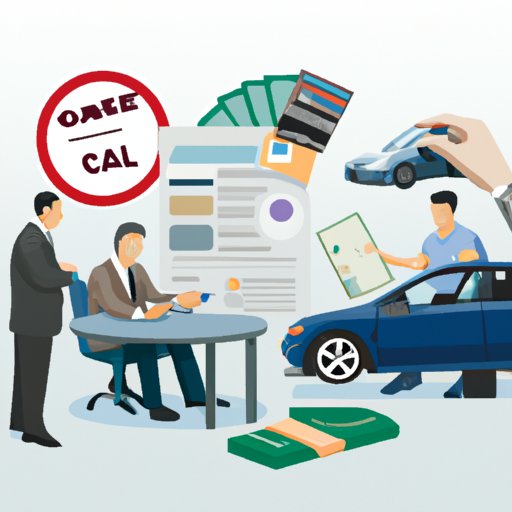Introduction
When it comes to buying a car, one of the most important decisions you can make is how to finance it. One option that many people consider is dealer financing. But what exactly is dealer financing? And how does it work? This article will provide an in-depth exploration of dealer financing, including the basics of how it works, the advantages and disadvantages compared to other forms of auto loans, strategies for negotiating a good deal, and common questions answered.
Basics of Dealer Financing
Dealer financing is when a car dealership offers financing options to customers who are looking to purchase a vehicle. The dealership will typically partner with a bank or other financial institution to offer various loan types, such as installment loans, lease-to-own agreements, and zero-interest loans. When you decide to use dealer financing, the dealership will be responsible for handling the entire loan process, from application to approval to repayment.
When considering a loan from a dealership, there are a few things to keep in mind. First, make sure you understand the terms of the loan and any fees associated with it. Be sure to ask about the interest rate, monthly payments, and any prepayment penalties. Additionally, make sure you know if the loan is secured or unsecured, as this may affect your ability to get approved. Finally, it’s important to read all paperwork thoroughly before signing anything.
Comparing Dealer Financing to Other Forms of Auto Loans
When deciding whether to pursue dealer financing or another type of auto loan, there are several factors to consider. Dealer financing often comes with higher interest rates than other types of loans, and may require a large down payment. On the other hand, the process is usually faster and more convenient than other types of loans, and may have more flexible repayment terms. Additionally, some dealerships offer special incentives, such as discounts, rebates, and extended warranties, which can make dealer financing an attractive option for some people.
Another thing to consider is the type of vehicle you’re looking to purchase. If you’re buying a new car, dealer financing may be the best option, as it often comes with lower interest rates and better incentives. However, if you’re buying a used car, you may be able to find a better deal through a bank or credit union.

Pros and Cons of Dealer Financing
The pros and cons of dealer financing depend on your individual situation and needs. On the plus side, it can be a fast and convenient way to finance a car, and you may be able to take advantage of special incentives offered by the dealership. Additionally, you may be able to negotiate a better interest rate or repayment terms than you would with another type of loan.
On the downside, dealer financing typically comes with higher interest rates than other types of loans, and may require a larger down payment. Additionally, some dealerships may not be willing to negotiate on terms or interest rates, so you may end up paying more than you need to. Finally, it’s important to remember that the dealership is acting as the middleman in the loan process, so you may not get the same level of customer service or protection as you would with a direct lender.

Strategies for Negotiating a Good Deal on Dealer Financing
Negotiating a good deal on dealer financing can help you save money and get the best possible terms. Here are a few tips to help you get started:
- Do your research – Make sure you understand the different loan types and interest rates available, and compare them to other lenders. This will give you a better understanding of what’s available, and may even give you leverage when negotiating with the dealership.
- Shop around – Don’t just settle for the first offer you get. Shop around and compare different dealerships to get the best possible terms.
- Ask questions – Don’t be afraid to ask questions about the loan and the terms. Make sure you understand everything before signing any paperwork.
- Be prepared to negotiate – Negotiating is key when it comes to getting the best deal. Be prepared to negotiate on interest rates, repayment terms, and other terms.

Common Questions About Dealer Financing Answered
Here are answers to some of the most common questions people have about dealer financing:
- What documents do I need? You’ll need to provide proof of income, proof of residence, and a valid driver’s license. Depending on the lender, you may also need to provide other documents, such as bank statements.
- How long does it take to get approved? It depends on the lender, but typically it takes a few days to a week to get approved.
- How much should I expect to pay in interest? The amount of interest you’ll pay depends on the terms of your loan and your credit score. Generally speaking, the higher your credit score, the lower your interest rate will be.
- How can I make sure I’m getting the best deal? Do your research, shop around, and be prepared to negotiate. Additionally, make sure you understand the terms of the loan and any fees associated with it before signing any paperwork.
Conclusion
In conclusion, dealer financing can be a great option for people looking to buy a car. It’s usually fast and convenient, and you may be able to take advantage of special incentives offered by the dealership. However, it’s important to understand the terms of the loan and any fees associated with it, and be prepared to negotiate for the best deal. By doing your research and shopping around, you can make sure you’re getting the best possible terms on your auto loan.
If you’re considering dealer financing for your next car purchase, it’s worth taking the time to explore all your options. Talk to friends and family who have gone through the process, read reviews of different dealerships, and compare loan types and interest rates to make sure you’re getting the best possible deal. With a bit of research and preparation, you can find a loan that fits your needs and budget.
(Note: Is this article not meeting your expectations? Do you have knowledge or insights to share? Unlock new opportunities and expand your reach by joining our authors team. Click Registration to join us and share your expertise with our readers.)
